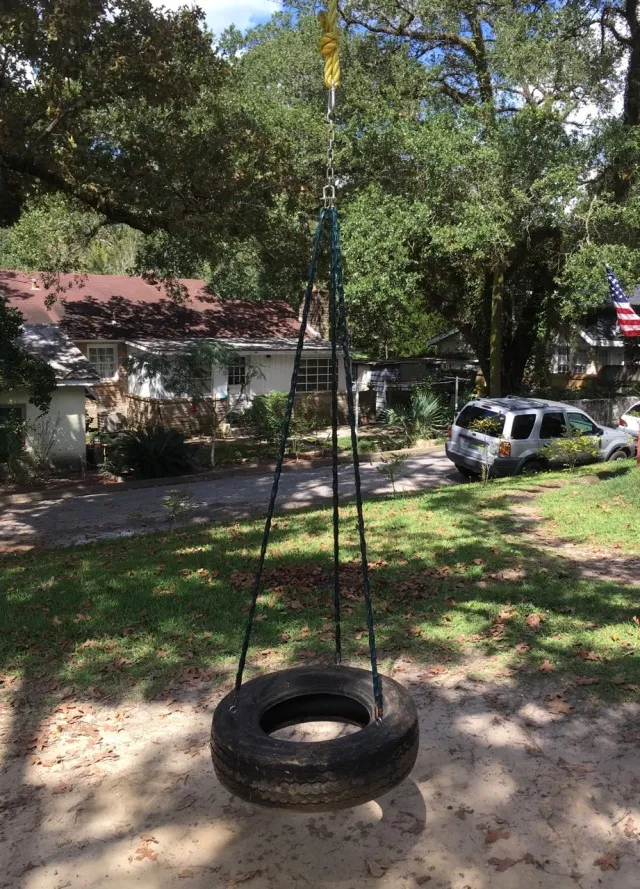Blog
Building the Best Tire Swing Ever: A DIY Guide

Hey there, fellow craft enthusiasts! Robert Kline here, ready to share my passion for transforming ordinary objects into extraordinary creations. Today, we’re diving into a project that’s close to my heart: building a tire swing. But not just any tire swing, this is going to be the “Best Tire Swing Ever”, guaranteed to bring joy to kids and adults alike!
This project is especially meaningful to me because it combines my love for crafting with my dedication to creating joyful experiences for children. I vividly remember the day I built our tire swing; the look of pure delight on my kids’ faces as they soared through the air was priceless.
Gathering Your Materials: A Treasure Hunt for Creativity
Before we embark on our tire swing adventure, let’s gather our supplies. I always find this part exciting, like embarking on a treasure hunt! Here’s what we’ll need:
The Star of the Show:
- A large tire (15″ rim diameter is perfect, 14″ works too)
The Supporting Cast (Hardware):
- Three 1/4″ stainless steel eye bolts
- Six regular washers
- Three fender washers
- Three stop-nuts
- Three quick-links
- Swing-set chain with plastic coating (12 feet total)
- One heavy-duty shackle
- One large stainless steel snap-link
- Thick braided-nylon rope (7/8″ diameter is recommended)
Tools of the Trade:
- Drill with 1/4″ drill bit
- Pliers
- Ratchet with deep-well socket
Finding the Perfect Tire:
Don’t worry if you don’t have an old tire lying around. As a seasoned DIY enthusiast, I’ve learned that one person’s trash is another’s treasure! Check local auto shops, tire dealerships, or even online marketplaces – you’re sure to find the perfect candidate.
Building the Swing: From Tire to Triumph
Now comes the fun part – transforming these raw materials into a source of endless fun. Don’t worry, I’ll guide you every step of the way!
Step 1: Preparing the Tire – Drainage is Key!
First, we’ll prepare our tire. Choose the side that will be the top of the swing and drill three 1/4″ holes, evenly spaced, along the sidewall. These are our tie-in points for the chains.
Pro Tip: To prevent water from pooling in the tire, flip it over and drill six or more 1/4″ holes in the opposite sidewall. Spin the drill bit in each hole while moving it up and down to ensure proper drainage.
 Tire Swing Construction
Tire Swing Construction
Step 2: Creating Secure Tie-In Points
Next, we’ll create secure tie-in points using our eye bolts, washers, and nuts. Insert an eye bolt into each of the three holes on the top side of the tire.
Pro Tip: Remember the order of components – one regular washer on top, followed by the fender washer, another regular washer, and finally, the stop-nut underneath. Tighten the nut securely with your ratchet.
 Tire Swing Construction
Tire Swing Construction
Step 3: Attaching the Chains – Evenness is Crucial
Cut your swing-set chain into three equal lengths, each about 4 feet long. Ensure each chain has the exact same number of links to prevent a lopsided swing.
“As an experienced crafter,” shares Sarah, a fellow DIY enthusiast, “I’ve learned the hard way that accuracy in the early stages is crucial for a successful outcome!”
Attach a quick-link to each eye bolt, and then connect the other end of each quick-link to a chain. Remember, tighten the quick-link’s bolt downward to prevent loosening due to gravity.
 Tire Swing Construction
Tire Swing Construction
Step 4: Gathering the Chains – The Shackle’s Role
Now, bring the three chains together at the top and secure them with the shackle. This creates a single, strong tie-in point for our rope. Make sure the chains aren’t twisted before tightening the shackle’s bolt.
 Tire Swing Construction
Tire Swing Construction
Step 5: Adding a Snap-Link for Convenience
For easy removal and adjustments, attach your large snap-link to the shackle. This allows you to quickly detach the swing without untying knots, especially useful when you need to store it away or during harsh weather.
 Tire Swing Construction
Tire Swing Construction
Step 6: The Rope – Strength and Durability Are Non-Negotiable
This is where safety and durability are paramount. Choose a high-quality braided-nylon rope – it’s stronger and more resistant to wear and tear than cheaper alternatives.
“Remember,” I always emphasize, “never compromise on safety. Invest in quality materials, especially when it comes to items your loved ones will be using!”
Measure the distance from your snap-link to the tree branch, adding 3-4 feet for knots and adjustments. Tie a secure loop (an overhand knot on a bight works great) at each end of the rope.
Step 7: Choosing the Right Tree and Branch – Safety First!
Selecting the right tree and branch is crucial for a safe and enjoyable experience.
- Live and Strong: Choose a healthy tree with a sturdy, live branch that’s at least 8 inches in diameter.
- Clearance: Ensure ample clearance from the trunk and any obstacles. A good rule of thumb: the distance from the branch to the trunk should be equal to or greater than the branch’s height from the ground.
 Tire Swing Construction
Tire Swing Construction
Step 8: Hanging the Swing – The Final Act
Carefully drape the rope over the chosen branch. Pass one end of the rope through the loop at the other end, and pull it tight to secure it. This method avoids damaging the tree and provides a secure hold.
 IMG_3180
IMG_3180
Step 9: Time for Testing and Enjoying!
Before inviting any eager swingers, test the swing’s sturdiness by carefully putting your weight on it. Once you’re confident in its safety, it’s time to let the fun begin!
 Tire Swing Construction
Tire Swing Construction
A Few Final Thoughts…
As with any outdoor play equipment, regular inspection and maintenance are essential for ensuring continued safety and enjoyment. Check the rope, chains, and hardware regularly for signs of wear and tear, and replace any damaged parts promptly.
Remember, crafting is about more than just the finished product; it’s about the journey, the creativity, and the joy it brings. So go ahead, build that “Best Tire Swing Ever” and create lasting memories with your loved ones!
For more creative DIY projects and unique handmade gift ideas, explore the rest of Robert Kline Art. We’d love to hear about your tire swing adventures – share your experiences and photos in the comments below!
